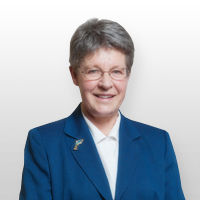Title of Presentation
“Cosmic Fireworks – Finding Transient Events in the Universe”
Often when we view the Universe in a new way, new and unexpected phenomena are discovered. Recent developments in detectors (for example CCDs) and in computers are now allowing astronomers to search systematically for short duration phenomena – flares, bursts and other kinds of changes in the brightness of stars and galaxies. Some such phenomena were already known (supernovae, for example), and some have been accidentally discovered (gamma ray bursts, for example). There has also recently been more systematic searching for moving objects, such as asteroids that might impact the earth.
We are now entering a new phase with more and bigger telescopes, larger data flows, and observations with new, lower frequency, radio telescopes. This talk will describe this burgeoning field and speculate on what might be found.
Profile
- A brief Biography
-
Currently a Visiting Professor of Physics in Oxford University, she has been a Dean of Science at the University of Bath and was for ten year Professor of Physics at the Open University, and had a wonderful year as a Distinguished Visiting Professor at Princeton University. Her appointment to the Open University doubled the number of female full professors of physics in the UK!
She read a Physics degree at Glasgow University, Scotland. This was followed by a PhD in Cambridge (UK) in Radio Astronomy. During her time there she was involved in the discovery of pulsars, opening up a new branch of astrophysics – work which was recognised by the award of a Nobel Prize to her supervisor. She worked subsequently in astronomy at many wavelengths and in many roles, for much of this period working part-time while raising a family. She has used telescopes flown on high-altitude balloons, launched on rockets and carried on satellites, and built a radio telescope which was firmly grounded in Cambridgeshire. Later in her career she could be found in Hawaii panting for breath at 14000′ and using the UK’s infrared or millimetre waveband telescopes.
The Oppenheimer prize, the Michelson medal, and the Magellanic Premium have been awarded to her by learned bodies in the US. UK and US universities have conferred honorary doctorates on her. She is now a Fellow of the Royal Society, and was elected a Foreign Associate of the US National Academy of Sciences in 2005.
She has been President of the Royal Astronomical Society and was the first female President of the UK’s Institute of Physics. She is now the first female President of the Royal Society of Edinburgh, Scotland’s National Academy.
The public appreciation and understanding of science have always been important to her, and she is much in demand as a speaker and broadcaster. She hopes that her presence as a senior woman in science will encourage more women to consider a career in science.
In her spare time she walks, gardens, listens to choral music and is active in the Religious Society of Friends (Quakers). She has co-edited an anthology of poetry with an astronomical theme – ‘Dark Matter; Poems of Space’.
- Details of selected Awards and Honors
-
Fellow of: Royal Society (London), Royal Society of Edinburgh (Scotland), Royal Irish Academy
Overseas Fellow of: National Academy of Sciences (USA), American Philosophical Society; Science Academy (Turkey)
Royal Medal, Royal Society London
Gold Medal, Spain – Consejo Superior de Investigaciones Cientificas
36 (approximately) Honorary Doctorates including Cambridge (UK), Harvard, McGill, London






